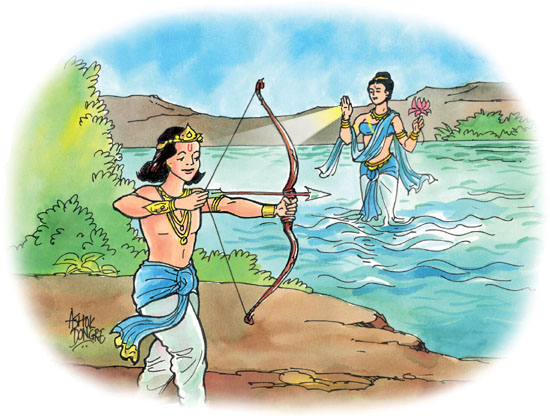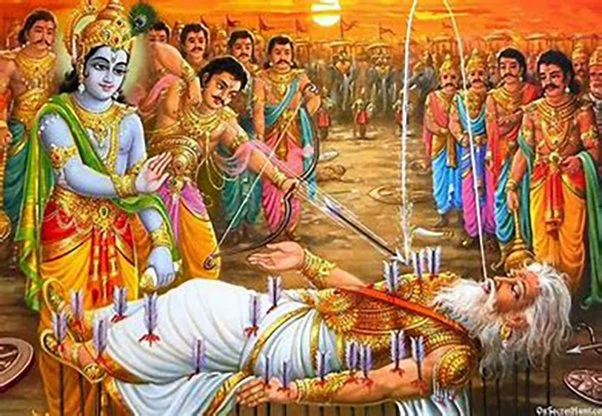
Devavrata, the surviving son of Shantanu and Ganga, was made crown prince by Shantanu. Thereafter, in order to arrange marriage of his father Shantanu with Satyavati, Devavrata assured Satyavati’s father that only her sons and their descendants will become kings of their kingdom and he would remain a bachelor throughout his life and took a oath to that effect.
rājyaṃ tāvat pūrvam eva mayā tyaktaṃ narādhipa
apatyahetor api ca karomy eṣa viniścayam
adya prabhṛti me dāśabrahmacaryaṃ bhaviṣyati
aputrasyāpi me lokā bhaviṣyanty akṣayā diviYe kings, I have already relinquished my right to the throne, I shall now settle the matter of my children. O fisherman, from this day I adopt the vow of Brahmacharya (study and meditation in celibacy). If I die sonless, I shall yet attain to regions of perennial bliss in heaven!'
Thus, he was called Bhishma, thereafter.
It is to be remembered that
- Bhishma did not give any word as to his safeguarding the kingdom till his death.
- both Bhishma and his step mother Satyavati were almost of same age, ie., around 20 years.
At that junction his father Shantanu gave him a boon that he would live as long a he wishes and death would approach him only at his wish - svacchandamaraṇaṃ.
तच्छ्रुत्वा दुष्करं कर्म कृतं भीष्मेण शान्तनुः ।
स्वच्छन्दमरणं तुष्टो ददौ तस्मै महात्मने ॥
न ते मृत्युः प्रभविता यावज्जीवितुमिच्छसि।
त्वत्तो ह्यनुज्ञां संप्राप्य मृत्युः प्रभविताऽनघ॥
And Santanu also, hearing of the extraordinary achievements of his son, became highly gratified and bestowed upon the high-souled prince the boon of death at will, saying, 'Death shall never come to you as long as you desire to live. Truly death shall approach you, O sinless one, having first obtained your command.'"
—-
Shantanu also begat upon Satyavati sons named Chitrangada and Vichitravirya And, before Vichitravirya attained to majority, Shantanu attained death. Bhishma, placing himself under the command of Satyavati, installed her eldest son Chitrangada on the throne.
By that time Bhishma might have attained the age of around 40 years.
Even at this junction also, Bhishma did not give any word to his father Shantanu, as to his safeguarding the kingdom till his death.
After the untimely deaths of Chitrangada and Vichitravirya, without children, Satyavati requested Sage Vyasa to produce sons to Ambika and Ambalika, the wives of Vichitravirya. Thus, Dhritarashtra, Pandu were born.
—-
After the death of Pandu and Madri and return of Kunti, alongwith her 5 sons, to Hastinapura, the elders arrange for performing Shraddha ceremony Pandu and Madri.
Thereafter, Sage Vyasa advised his mother Satyavati to leave the Royal palace devote herself to contemplation through Yoga.
śrāddhāvasāne tu tadā dṛṣṭvā taṃ duḥkhitaṃ janam
saṃmūḍhāṃ duḥkhaśokārtāṃ vyāso mātaram abravītatikrānta sukhāḥ kālāḥ pratyupasthita dāruṇāḥ
śvaḥ śvaḥ pāpīya divasāḥ pṛthivī gatayauvanābahu māyā samākīrṇo nānā doṣasamākulaḥ
luptadharmakriyācāro ghoraḥ kālo bhaviṣyatigaccha tvaṃ tyāgam āsthāya yuktā vasa tapovane
mā drakṣyasi kulasyāsya ghoraṃ saṃkṣayam ātmanaḥtatheti samanujñāya sā praviśyābravīt snuṣām
ambike tava putrasya durnayāt kila bhāratāḥ
sānubandhā vinaṅkṣyanti paurāś caiveti naḥ śrutamtat kausalyām imām ārtāṃ putraśokābhipīḍitām
vanam ādāya bhadraṃ te gacchāvo yadi manyasetathety ukte ambikayā bhīṣmam āmantrya suvratā
vanaṃ yayau satyavatī snuṣābhyāṃ saha bhāratatāḥ sughoraṃ tapaḥ kṛtvā devyo bharatasattama
dehaṃ tyaktvā mahārāja gatim iṣṭāṃ yayus tadā"When the Sraddha had been celebrated in the manner mentioned above, the venerable Vyasa, seeing all the subjects sunk in grief, said one day to his mother Satyavati,
'Mother, our days of happiness have gone by and days of calamity have succeeded. Sin begin to increase day by day. The world hath got old.
The empire of the Kauravas will no longer endure because of wrong and oppression. Go thou then into the forest, and devote thyself to contemplation through Yoga.
Henceforth society will be filled with deceit and wrong. Good work will cease. Do not witness the annihilation of thy race, in thy old age.'
"Acquiescing in the words of Vyasa, Satyavati entered the inner apartments and addressed her daughter-in-law, saying,
'O Ambika, I hear that in consequence of the deeds of your grandsons, this Bharata dynasty and its subjects will perish. If thou permit, I would go to the forest with Kausalya (Ambalika), so grieved at the loss of her son (Pandu).'
O king, saying this the queen, taking the permission of Bhishma also, went to the forest. And arriving there with her two daughters-in-law, she became engaged in profound contemplation, and in good time leaving her body ascended to heaven.'
By this time Bhishma might have attained the age of around 80 years.
—-
It is to be remembered that Bhishma did not give any word at any point of time, as to his safeguarding the kingdom till his death.
So, nothing stops him from taking the route of Vanaprastha, alongwith his step mother Satyavati, as the surviving grandson of Satyavati,ie., Dhritarashtra, was already ruling the Kingdom, with the help of righteous Vidura, by the time Pandavas returned to Hastinapura.
However, Bhishma did not take the course of Vanaprastha, even at the age of 80 years, though his step mother and his sisters-in-law had already decided to take the route of Yoga. This was his 1st mistake.
—-
After Pandavas marrying Draupadi and coming back to Hastinapura, Bhishma might have attained the age of around 100 - 110 years.
After Bhishma advising Dhritarashtra to divide the kingdom and give Pandavas their due share, the same was followed by the latter. And, thereafter, till the performance of Rajasuya Yagna, there were no quarrels between Pandavas and Kauravas.
---
Thus, Bhishma had the golden opportunity at that juncture, to take route of Vanaprastha, as both Pandavas and Kauravas were matured enough to take their decisions.
Still, Bhishma did not take the course of Vanaprastha, even at the age of 100 - 110 years and remained in Hastinapura.
----
Shri Krishna goes to Hastinapur, after Pandavas completing their exile period of 12 years and 1 year period of living incognito, as a mediator. After making a futile attempt to reconcile between Pandavas and Kauravas, Shri Krishna comes back to Yudhisthira and narrates what transpired in Hastinapur.
Then, he narrates the words addressed to Bhishma by Vidura.
vidura uvāca।
dēvavrata nibōdhēdaṃ vacanaṃ mama bhāṣataḥ।
pranaṣṭaḥ kauravō vaṃśastvayāyaṃ punaruddhṛtaḥ ॥
tanmē vilapamānasya vacanaṃ samupēkṣasē।
kōyaṃ duryōdhanō nāma kulē'sminkulapāṃsanaḥ ॥
yasya lōbhābhibhūtasya matiṃ samanuvartasē ।
anāryasyākṛtajñasya lōbhēna hṛtacētasaḥ ।
atikrāmati yaḥ śāstraṃ piturdharmārthadarśinaḥ ॥
ētē naśyanti kuravō duryōdhanakṛtēna vai।
yathā tē na praṇaśyēyurmahārāja tathā kuru ॥
māṃ caiva dhṛtarāṣṭraṃ ca pūrvamēva mahāmatē।
citrakāra ivālēkhyaṃ kṛtvā sthāpitavānasi ॥
prajāpatiḥ prajāḥ sṛṣṭvā yathā saṃharatē tathā।
nōpēkṣaśva mahābāhō paśyamānaḥ kulakṣayam ॥
atha tē'dya matirnaṣṭā vināśē pratyupasthitē ।
vanaṃ gaccha mayā sārdhaṃ dhṛtarāṣṭrēṇa caiva ha ॥
baddhvā vā nikṛtiprajñaṃ dhārtarāṣṭraṃ sudurmatim ।
śādhīdaṃ rājyamadyāśu pāṇḍavairabhirakṣitam ॥
And Vidura said,
'O Devavrata, attend to the words I speak. This race of Kuru, when it became extinct, was revived by thee.
It is for this that thou art indifferent to my lamentations now. In this our race, its stain is this Duryodhana, whose inclinations are followed by thee, although he is enslaved by avarice, and is wicked and ungrateful and deprived of his senses by lust.
The Kurus will certainly bear consequence of the acts of that Duryodhana who transgresseth the command of his father, observant of virtue and profit. O great king, act thou so that the Kurus may not perish.
Like a painter producing a picture, it was thou, O king, who hadst caused me and Dhritarashtra to spring into life. The Creator, having created creatures, destroys them again. Do not act like him. Seeing before thy very eyes this extinction of thy race, be not indifferent to it.
If, however, your understanding is gone in consequence of the universal slaughter that is at hand, go then to the woods, taking me and Dhritarashtra with thee.
Otherwise, binding this very day wicked Duryodhana that hath deceit for his wisdom, rule this kingdom with the sons of Pandu guarding it around.
Please note the words of Vidura:
If, however, your understanding is gone in consequence of the universal slaughter that is at hand, go then to the woods, taking me and Dhritarashtra with you.
Even Vidura, just before the great war, was of the opinion that if Bhishma was not in a position to control Duryodhana, then it is better for Bhishma to take the route of the Forest, ie., Vanaprastha, alongwith Dhritarashtra and Vidura.
- Even at this stage, Bhishma did not pay heed to Vidura’s advice.
---
This resulted in
- Bhishma inadvertently becaming part of the ongoing power struggles between the Kauravas and Pandavas.
- Bhishma becoming witness to the game of dice and consequent ill-treatment of Pandavas and Draupadi
- Bhishma's involvement in the Kurukshetra War, where his adherence to dharma and loyalty to the throne put him in a position of conflict against the Pandavas, whom he loved

No comments:
Post a Comment